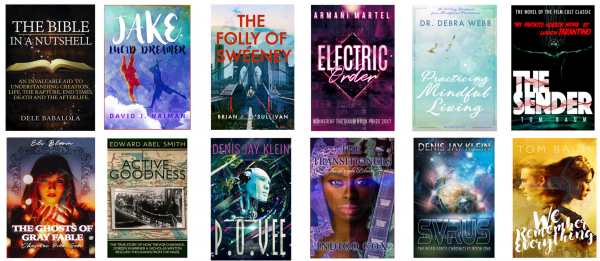
Founder Henry Baum
SPR founder Henry Baum on reclaiming the dirty words “vanity publishing” as an indie author in the post-selfie-stick generation.
In my interview on Jane Friedman’s site, Chris Jane asks about SPR’s publishing imprint, Kwill Books:
Are authors likely to recoup the cost of the contract… or is earning money secondary to simply getting attention? Really what I’m asking is, if not money, do they get attention even possibly from agents that could lead to a contract and eventual income? Or is it, in the end, ultimately vanity?
Here’s my answer, in part:
For some reason, this is the sort of question asked to self-publishers. Would you ask an independent press if they can guarantee thousands of sales right off? It’s a miracle for small presses to sell 3,000 books over a book’s lifetime. So writers might not be guaranteed to recoup their investment, but they’ve gotten editing, design, and a launch that gives them a better chance. That’s valuable, even if it doesn’t pay back immediately.
Is that vanity? I don’t think so. What that question is implying is, if a book isn’t making money, then it’s vain to bother. Money isn’t the only kind of value—that’s much darker an idea than self-releasing a book. It’s not vain to express yourself and want people to read it. It’s vain to get plastic surgery.

Kwill Books gives you professional design and marketing, so why so shameful to pay?
Chuck Wendig has a post up about a heftily-priced bundled self-publishing service, bouncing off a warning on Writer Beware. I don’t want to get into the merits of that particular service, but given that Kwill is a bundled self-publishing service, I do take issue with the premise that bundled services are bad. Wendig writes in How Much Should Writers Pay To Be Published?:
In the OLD WAYS OF THE ELDER PUBLISHERS, you didn’t pay for things like cover, marketing, editing. They did that because they are the ones backing the book and the ones with the ecosystem to (ideally) help that book not just survive, but thrive. They did that shit, because that shit was their job.
As a self-publisher, that shit is now your job, but it is of course unreasonable to demand that a single author is also simultaneously really good at cover design, e-book design, marketing, editing, and so on. Which means you have to hire people to do this thing for you, which somewhat disrupts that whole “no money out” rule, yeah? Though the core truth remains: paying for these things are not you paying to get published. Meaning, you could literally write a book (or any equivalent steaming diaper fire that consists of words), upload it to Amazon or wherever, and boom, YOU GOT PUBLISHED. No fees. No nada. Paying out money is therefore to make your existing product better — not get the product to shelves.
And so, it would seem then that the rise of certain bundling services is an attractive option — they bundle together editing, cover, marketing, liquor purchases, grief counseling, and other vital services — and then you pay one price and that gaggle of book-wizards turn your self-published book into something that looks better than the aforementioned diaper fire. It’s sensible enough — if you’re going to pay for these services individually, then if you find a trusted service-bundler, more power to you.
All of this is completely sensible – except he’s using the example of one overpriced service to then say that paying to publish is wrong. Kwill offers 100% royalties, a publisher’s imprint (so you can get more Amazon categories), actual Amazon marketing, and other features. In other words, we’re trying to do it right.
Let’s just say this right off: uploading a book to KDP is not a major accomplishment. It’s about as easy as starting a Facebook account. Writing the book is hard – editing it, formatting it, designing the cover are hard. But publishing it? Not really. But there are people who want to pay someone else to do all the work. If the service is fairly priced with good terms, then what’s the problem?
As often happens in the self-publishing ecosystem, the entire industry is held to account for the worst of the lot. So because Author Solutions charges too much for services, then any assisted self-publishing service is also bad. Really, this is a way for people who upload a book to KDP to feel better about themselves than people who pay for it. This doesn’t make them a better writer, or even a better publisher, it just means they got to the same place differently. But someone always needs to be on the bottom of the totem pole.
And the irony is this is how all of self-publishers were once treated. Traditionally-published authors used to thumb their noses at self-publishers because they pointed to bad books and said: Look, you all suck! And then people started making a bunch of money on the Kindle and people shut up about that. Vanity publishing is the new self-publishing.

Chuck Wendig
The heart of Wendig’s post comes in this comment:
Self-publishing means I do it. Not you. It ceases to be self-pub at that point.
If you are a publisher (which you are), you are either above board and pay the writers, or you charge money, and charging money generally makes you a vanity press.
Self-publishing begins at the point that you make the decision to self-release a book. The fact that some subsidy services fleece their authors is not an argument against using a service any more than a terrible self-published book is an argument against self-publishing. It’s just an argument to do it right.
What Wendig is saying that paying for editing, design, and marketing is fine, but the point where you pay to publish is vain. If money is being paid, money is being paid. It doesn’t strike me as terribly vain to hire someone to do some admin work. Vanity publishing is a term left over from the pre-Print On Demand era, when writers were buying cartons of books they had no chance of selling. In this day and age, with free self-publishing services, hiring someone to handle e-publishing does not require the same kind of expense. If authors are giving up royalties that’s a problem, but if they’re getting 100% royalties, they’re just following a traditional self-publishing model: forgoing an advance to potentially make more money long-term. At Kwill, at least, the bulk of the fee is for editing, design, and marketing. Publishing is the easy part.
If it’s this cheap and easy, why bother paying someone to do it? Because they want to. Really, that’s enough of a reason. Not everyone wants to deal with the tools of self-publishing – they just want a book.
In the post-Kindle era, post-social media era, post-blogging era, post-selfie era, vain self-publishing has taken on a different meaning. If your response is, well, all those services are free so it’s vain to pay, there’s money going around for all those services (selfie sticks, web designers, social media managers, etc.). It’s just a different world now where self-publishing is the norm in all sorts of ways, and if someone wants to pay for help, that’s their prerogative. If they do happen to pay for an exorbitant, unscrupulous service, their main fault is making a bad purchase, not being a lesser writer. Put another way: the ethics of a service fall on the company, not the author.
All writing is vanity writing. It’s thinking your mind’s work is important enough that people should shell out money for it. That’s the case for a traditional published book or anything else. The fact that a writer chose to pay someone to publish a book does not change the words on the page one iota, and really that’s where a book should live and die. The publisher? Doesn’t matter. I mean, that’s why we all got into self-publishing in the first place.
Get an Editorial Review | Get Amazon Sales & Reviews | Get Edited | Get Beta Readers | Enter the SPR Book Awards | Other Marketing Services






















Leave A Comment